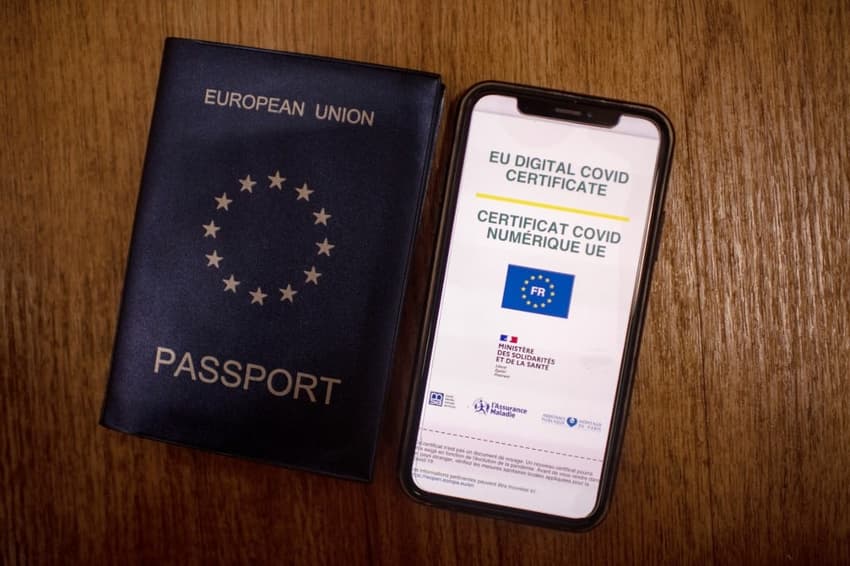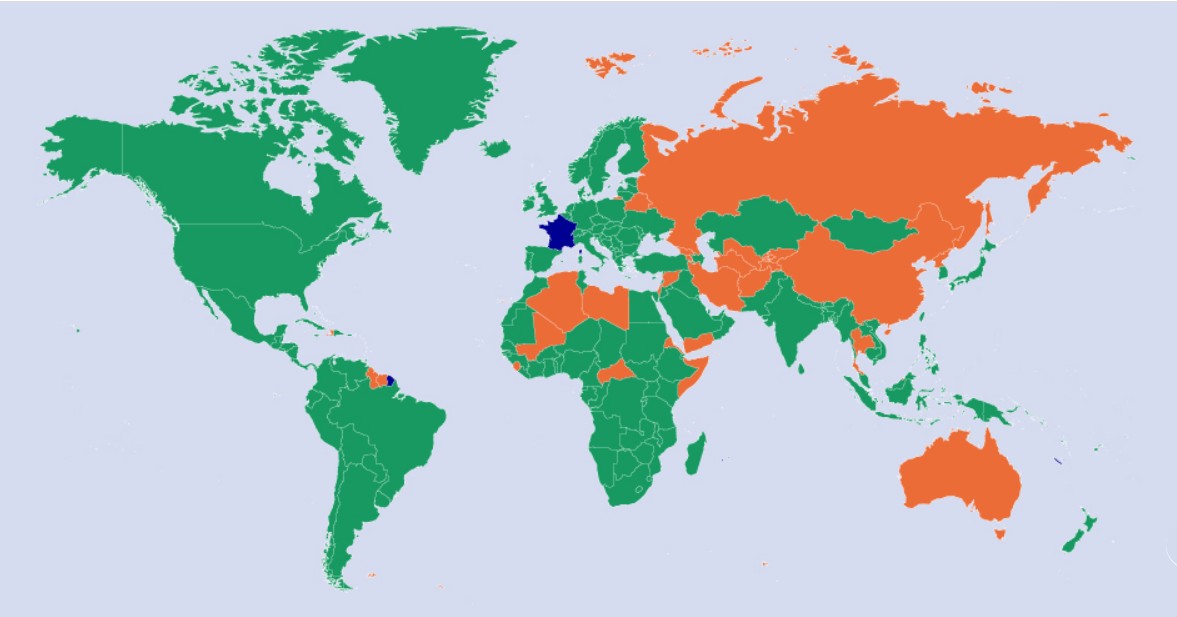Everything you need to know about travel to France from within the EU

After two years of limited travel many people are planning a holiday this year and France is a popular destination - but it's easy to lose track of the latest travel rules. Here's what you need to know if you are coming to France from a country that is within the EU or Schengen zone.
Restrictions
France operates a 'traffic light' system that has been in place since summer 2020, assigning countries a colour based on their Covid infection rates.
These days most of the world is green - the lightest level of restriction - including all the countries in the EU and Schengen zone. Find full details on the government website here.

Map: French interior ministry
Vaccinated - if you are fully vaccinated according to the French definition (see below) and travelling from a green zone country all you need to show at the border is proof of vaccination. There is no requirement for extra paperwork such as passenger locator forms or health declarations and no Covid tests needed. Once in France you are not required to quarantine.
Unvaccinated - if you are not fully vaccinated according to the French definition (see below) you will need to show a negative Covid test at the border. The test can be either a PCR test taken within the previous 72 hours or an antigen test taken within the previous 48 hours. Once in France you are not required to quarantine.
Fully vaccinated - in order to qualify as 'fully vaccinated' you must be vaccinated with an EMA approved vaccine (Pfizer, Moderna, Astra-Zeneca or Janssen) and must be at least 7 days after your final dose (or 28 days after in the case of Janssen). If you had your vaccine more than nine months ago, you will need a booster shot in order to still be classificed as 'fully vaccinated' if you are aged 18 and over.
Anyone vaccinated within the EU/Schengen zone will have the EU digital vaccine pass, but vaccination certificates issued outside the EU are also accepted at the French border.
Children - The rules on vaccination apply to all children aged 12 and over. Under 12s do not need to supply proof of vaccination at the border. Children aged between 12 and 18 do not need a booster shot, even if their vaccine took place more than nine months ago.
The above rules apply to all EU and Schengen zone countries - if you are travelling from the UK click HERE, click HERE for travel from the USA and HERE for travel from other non-EU countries.
In France
So you've made it into France, but what are the rules once you are here?
On May 16th, France ended the mask requirement for public transport, representing one of the last Covid restrictions still in place.
Masks - masks are now only compulsory in health establishments, although they remain recommended on public transport. They are not required in other indoor spaces such as shops, bars, restaurants and tourist sites, although private businesses retain the legal right to make mask-wearing a condition of entry.
Health pass - the health pass was suspended in March and is no longer required to enter venues such as bars, restaurants and tourist sites. It is still required to enter establishements with vulnerable residents such as nursing homes. In this case it is a health pass not a vaccine pass - so unvaccinated people can present a recent negative Covid test.
Hygiene gestures - the government still recommends the practice of hygiene gestures such as hand-washing/gel and social distancing although this is a recommendation and not a rule.
Self-isolation - if you test positive for Covid while in France you are legally required to self isolate - full details HERE.
READ ALSO How tourists and visitors to France can get a Covid test
Comments (1)
See Also
Restrictions
France operates a 'traffic light' system that has been in place since summer 2020, assigning countries a colour based on their Covid infection rates.
These days most of the world is green - the lightest level of restriction - including all the countries in the EU and Schengen zone. Find full details on the government website here.

Vaccinated - if you are fully vaccinated according to the French definition (see below) and travelling from a green zone country all you need to show at the border is proof of vaccination. There is no requirement for extra paperwork such as passenger locator forms or health declarations and no Covid tests needed. Once in France you are not required to quarantine.
Unvaccinated - if you are not fully vaccinated according to the French definition (see below) you will need to show a negative Covid test at the border. The test can be either a PCR test taken within the previous 72 hours or an antigen test taken within the previous 48 hours. Once in France you are not required to quarantine.
Fully vaccinated - in order to qualify as 'fully vaccinated' you must be vaccinated with an EMA approved vaccine (Pfizer, Moderna, Astra-Zeneca or Janssen) and must be at least 7 days after your final dose (or 28 days after in the case of Janssen). If you had your vaccine more than nine months ago, you will need a booster shot in order to still be classificed as 'fully vaccinated' if you are aged 18 and over.
Anyone vaccinated within the EU/Schengen zone will have the EU digital vaccine pass, but vaccination certificates issued outside the EU are also accepted at the French border.
Children - The rules on vaccination apply to all children aged 12 and over. Under 12s do not need to supply proof of vaccination at the border. Children aged between 12 and 18 do not need a booster shot, even if their vaccine took place more than nine months ago.
The above rules apply to all EU and Schengen zone countries - if you are travelling from the UK click HERE, click HERE for travel from the USA and HERE for travel from other non-EU countries.
In France
So you've made it into France, but what are the rules once you are here?
On May 16th, France ended the mask requirement for public transport, representing one of the last Covid restrictions still in place.
Masks - masks are now only compulsory in health establishments, although they remain recommended on public transport. They are not required in other indoor spaces such as shops, bars, restaurants and tourist sites, although private businesses retain the legal right to make mask-wearing a condition of entry.
Health pass - the health pass was suspended in March and is no longer required to enter venues such as bars, restaurants and tourist sites. It is still required to enter establishements with vulnerable residents such as nursing homes. In this case it is a health pass not a vaccine pass - so unvaccinated people can present a recent negative Covid test.
Hygiene gestures - the government still recommends the practice of hygiene gestures such as hand-washing/gel and social distancing although this is a recommendation and not a rule.
Self-isolation - if you test positive for Covid while in France you are legally required to self isolate - full details HERE.
READ ALSO How tourists and visitors to France can get a Covid test
Join the conversation in our comments section below. Share your own views and experience and if you have a question or suggestion for our journalists then email us at [email protected].
Please keep comments civil, constructive and on topic – and make sure to read our terms of use before getting involved.
Please log in here to leave a comment.